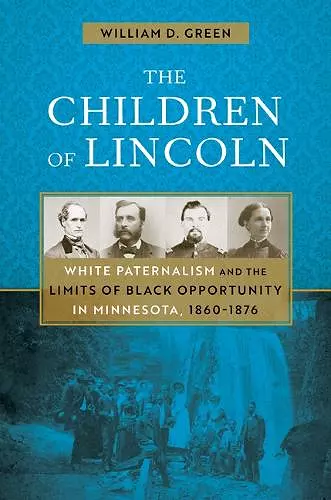The Children of Lincoln
White Paternalism and the Limits of Black Opportunity in Minnesota, 1860–1876
Format:Paperback
Publisher:University of Minnesota Press
Published:23rd Feb '21
Currently unavailable, and unfortunately no date known when it will be back

How white advocates of emancipation abandoned African American causes in the dark days of Reconstruction, told through the stories of four Minnesotans
White people, Frederick Douglass said in a speech in 1876, were “the children of Lincoln,” while black people were “at best his stepchildren.” Emancipation became the law of the land, and white champions of African Americans in the state were suddenly turning to other causes, regardless of the worsening circumstances of black Minnesotans. Through four of these “children of Lincoln” in Minnesota, William D. Green’s book brings to light a little known but critical chapter in the state’s history as it intersects with the broader account of race in America.
In a narrative spanning the years of the Civil War and Reconstruction, the lives of these four Minnesotans mark the era’s most significant moments in the state, the Midwest, and the nation for the Republican Party, the Baptist church, women’s suffrage, and Native Americans. Morton Wilkinson, the state’s first Republican senator; Daniel Merrill, a St. Paul business leader who helped launch the first Black Baptist church; Sarah Burger Stearns, founder and first president of the Minnesota Woman Suffragist Association; and Thomas Montgomery, an immigrant farmer who served in the Colored Regiments in the Civil War: each played a part in securing the rights of African Americans and each abandoned the fight as the forces of hatred and prejudice increasingly threatened those hard-won rights.
Moving from early St. Paul and Fort Snelling to the Civil War and beyond, The Children of Lincoln reveals a pattern of racial paternalism, describing how even “enlightened” white Northerners, fatigued with the “Negro Problem,” would come to embrace policies that reinforced a notion of black inferiority. Together, their lives—so differently and deeply connected with nineteenth-century race relations—create a telling portrait of Minnesota as a microcosm of America during the tumultuous years of Reconstruction.
"Beautifully written and deeply researched, The Children of Lincoln provides intimate portraits of four white Republicans in Minnesota after the Civil War. Having established in his previous books that African Americans were more deeply rooted and influential in the state’s history than previously recognized, William D. Green demonstrates here that Minnesotans also played key roles in debates over racial equality that resonated far beyond state boundaries. He helps us understand not only the nation’s retreat from equality in the late nineteenth century but also the persistence of racial disparities in Minnesota and across the United States today."—William P. Jones, author of The March on Washington: Jobs, Freedom, and the Forgotten History of Civil Rights
"William D. Green has done an excellent job of reconstructing the individual lives and decisions made by four Lincoln Republicans who soon after 1865 washed their hands of postemancipation issues, one explicitly asserting, ‘We have done our part.’ He traces how these four (and by analogy most northern white Americans) disengaged from the struggle for equality and sent African Americans into a ‘new era of darkness,’ undermining the very freedoms that the Civil War promised."—Annette Atkins, author of Creating Minnesota: A History from the Inside Out
"Green brings to light a little-known but critical chapter in Minnesota’s history through four of these ‘children of Lincoln’ in Minnesota."—Pioneer Press
"Extensively researched and well written, Children of Lincoln is an excellent state study in the broader context of post–Civil War history."—CHOICE
"Green’s work should become required reading for those interested in the contradictory positions taken by white Republicans who championed black suffrage and equal citizenship rights but eventually abandoned black citizens to navigate by themselves continuing racial hostility and inequalities in both the North and South."—The Annals of Iowa
- Winner of The Children of Lincoln 2019
ISBN: 9781517912000
Dimensions: 210mm x 140mm x 51mm
Weight: unknown
512 pages